Guy Aridor
The Value of Personalized Recommendations: Evidence from Netflix
Nov 11, 2025Abstract:Personalized recommendation systems shape much of user choice online, yet their targeted nature makes separating out the value of recommendation and the underlying goods challenging. We build a discrete choice model that embeds recommendation-induced utility, low-rank heterogeneity, and flexible state dependence and apply the model to viewership data at Netflix. We exploit idiosyncratic variation introduced by the recommendation algorithm to identify and separately value these components as well as to recover model-free diversion ratios that we can use to validate our structural model. We use the model to evaluate counterfactuals that quantify the incremental engagement generated by personalized recommendations. First, we show that replacing the current recommender system with a matrix factorization or popularity-based algorithm would lead to 4% and 12% reduction in engagement, respectively, and decreased consumption diversity. Second, most of the consumption increase from recommendations comes from effective targeting, not mechanical exposure, with the largest gains for mid-popularity goods (as opposed to broadly appealing or very niche goods).
The MovieLens Beliefs Dataset: Collecting Pre-Choice Data for Online Recommender Systems
May 21, 2024
Abstract:An increasingly important aspect of designing recommender systems involves considering how recommendations will influence consumer choices. This paper addresses this issue by introducing a method for collecting user beliefs about un-experienced items - a critical predictor of choice behavior. We implemented this method on the MovieLens platform, resulting in a rich dataset that combines user ratings, beliefs, and observed recommendations. We document challenges to such data collection, including selection bias in response and limited coverage of the product space. This unique resource empowers researchers to delve deeper into user behavior and analyze user choices absent recommendations, measure the effectiveness of recommendations, and prototype algorithms that leverage user belief data, ultimately leading to more impactful recommender systems. The dataset can be found at https://grouplens.org/datasets/movielens/ml_belief_2024/.
The Economics of Recommender Systems: Evidence from a Field Experiment on MovieLens
Nov 25, 2022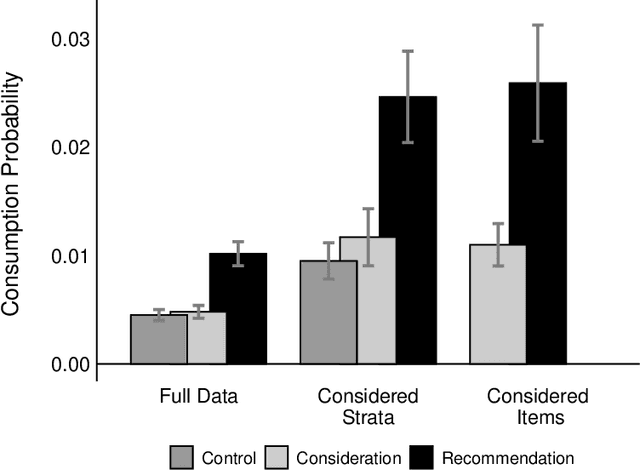
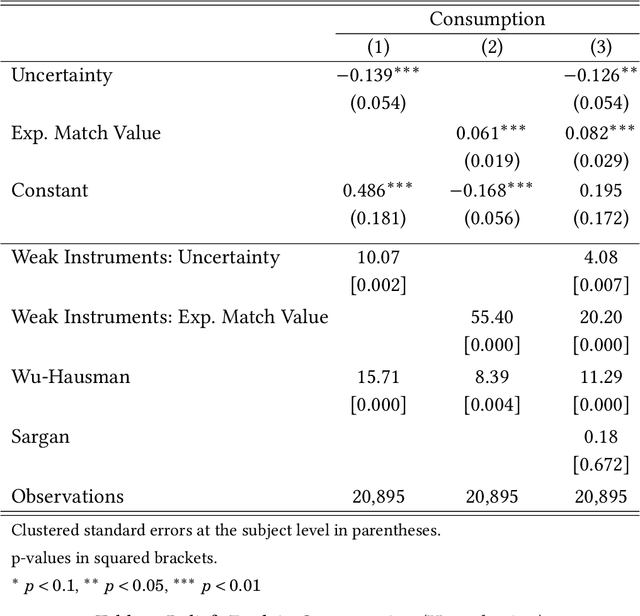
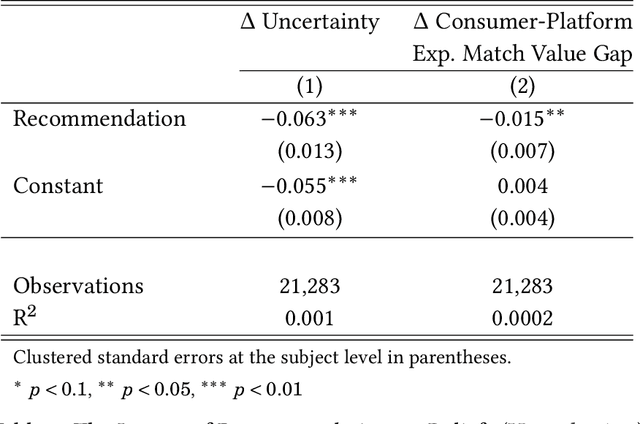
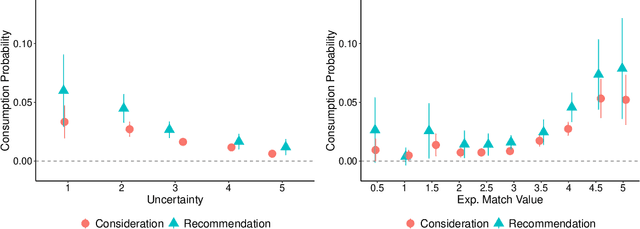
Abstract:We conduct a field experiment on a movie-recommendation platform to identify if and how recommendations affect consumption. We use within-consumer randomization at the good level and elicit beliefs about unconsumed goods to disentangle exposure from informational effects. We find recommendations increase consumption beyond its role in exposing goods to consumers. We provide support for an informational mechanism: recommendations affect consumers' beliefs, which in turn explain consumption. Recommendations reduce uncertainty about goods consumers are most uncertain about and induce information acquisition. Our results highlight the importance of recommender systems' informational role when considering policies targeting these systems in online marketplaces.
Competing Bandits: The Perils of Exploration Under Competition
Jul 20, 2020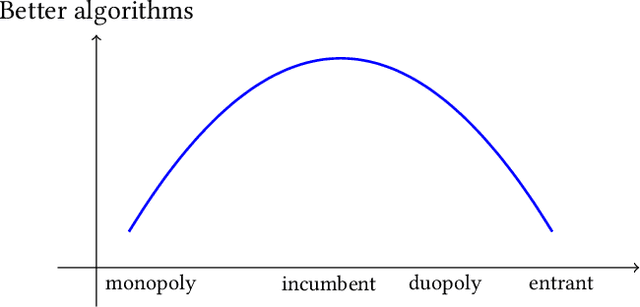
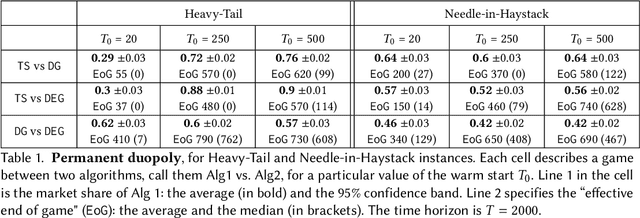
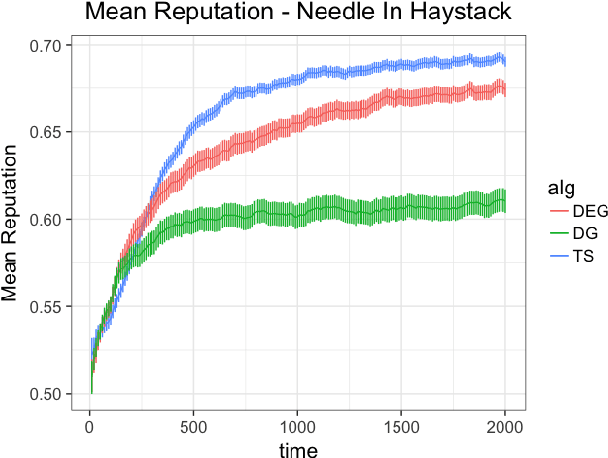
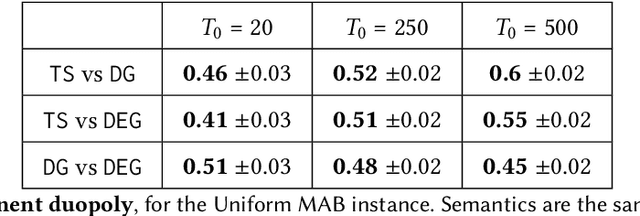
Abstract:Most online platforms strive to learn from interactions with consumers, and many engage in exploration: making potentially suboptimal choices for the sake of acquiring new information. We initiate a study of the interplay between exploration and competition: how such platforms balance the exploration for learning and the competition for consumers. Here consumers play three distinct roles: they are customers that generate revenue, they are sources of data for learning, and they are self-interested agents which choose among the competing platforms. We consider a stylized duopoly model in which two firms face the same multi-armed bandit instance. Users arrive one by one and choose between the two firms, so that each firm makes progress on its bandit instance only if it is chosen. We study whether and to what extent competition incentivizes the adoption of better bandit algorithms, and whether it leads to welfare increases for consumers. We find that stark competition induces firms to commit to a "greedy" bandit algorithm that leads to low consumer welfare. However, we find that weakening competition by providing firms with some "free" consumers incentivizes better exploration strategies and increases consumer welfare. We investigate two channels for weakening the competition: relaxing the rationality of consumers and giving one firm a first-mover advantage. We provide a mix of theoretical results and numerical simulations. Our findings are closely related to the "competition vs. innovation" relationship, a well-studied theme in economics. They also elucidate the first-mover advantage in the digital economy by exploring the role that data can play as a barrier to entry in online markets.
Competing Bandits: The Perils of Exploration under Competition
Feb 14, 2019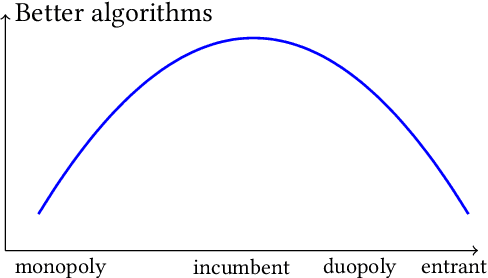
Abstract:We empirically study the interplay between exploration and competition. Systems that learn from interactions with users often engage in exploration: making potentially suboptimal decisions in order to acquire new information for future decisions. However, when multiple systems are competing for the same market of users, exploration may hurt a system's reputation in the near term, with adverse competitive effects. In particular, a system may enter a "death spiral", when the short-term reputation cost decreases the number of users for the system to learn from, which degrades its performance relative to competition and further decreases its market share. We ask whether better exploration algorithms are incentivized under competition. We run extensive numerical experiments in a stylized duopoly model in which two firms deploy multi-armed bandit algorithms and compete for myopic users. We find that duopoly and monopoly tend to favor a primitive "greedy algorithm" that does not explore and leads to low consumer welfare, whereas a temporary monopoly (a duopoly with an early entrant) may incentivize better bandit algorithms and lead to higher consumer welfare. Our findings shed light on the first-mover advantage in the digital economy by exploring the role that data can play as a barrier to entry in online markets.
 Add to Chrome
Add to Chrome Add to Firefox
Add to Firefox Add to Edge
Add to Edge